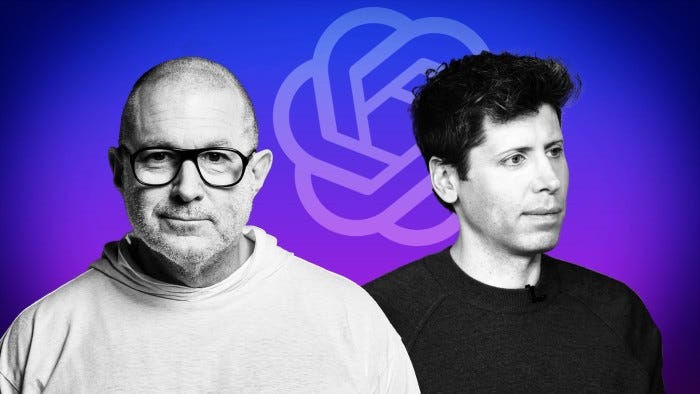Beyond the SmartPhone? Or an Actually Functional Siri without a Screen?: The Altman–Ive Ambition Is Going to Meet Physics, Compute, & Etiquette.
I smell a “welcome to the NFL” moment coming for this piece of OpenAI’s ambitions. But I also know that it is much too early and information is still much too thin for speculation to be worthwhile. A palm-sized, “always-on” screenless device sounds liberating—until battery limits, privacy needs, & cloud bills arrive. It will be very difficult to beat the slab on speed and certainty, & after that you still face the hurdles on behavior change and trust. To me, at least, the only possible victory looks like an info-butler with on‑device reflexes, not a talkative “friend” with a personality…
When I first read it, I thought there really was no point to Tim Bradshaw and company writing this story.
Yes, Jonny Ive and Sam Altman’s teams are probably doing something very interesting. But the reporters could not uncover enough meat for it to be worthwhile yet for us to analyze what their plans are likely to produce next year.
But, still, I found it too interesting to resist, and I could not stop thinking about it over the past week:
Tim Bradshaw, Cristina Criddle, Michael Acton, & Ryan McMorrow: OpenAI and Jony Ive grapple with technical issues on secretive AI device <https://www.ft.com/content/58b078be-e0ab-492f-9dbf-c2fe67298dd3>: ‘OpenAI and Ive are seeking to build a more powerful and useful machine. But two people familiar with the project said that settling on the device’s “voice” and its mannerisms were a challenge. One issue is ensuring the device only chimes in when useful, preventing it from talking too much or not knowing when to finish the conversation…. “The concept is that you should have a friend who’s a computer who isn’t your weird AI girlfriend . . . like [Apple’s digital voice assistant] Siri but better,” said one person who was briefed on the plans. OpenAI was looking for “ways for it to be accessible but not intrusive”. “Model personality is a hard thing to balance,” said another person close to the project. “It can’t be too sycophantic, not too direct, helpful, but doesn’t keep talking in a feedback loop.”… OpenAI’s device will be entering a difficult market…
And Adam Tooze asks:
Adam Tooze: Top Links 888 <https://adamtooze.substack.com/p/top-links-888-the-vaccine-paradox>: ‘Is the concept behind the multi-billion Ive-Altman tie up really all about “no more weird digital girlfriends”… and no “snarky friends” either? Is that it? Some kinda nicely balanced masculinity?…
I am not quite sure what that last word is doing there. It is lifting off from the person “briefed on the plans” who claimed that the desired product would present itself as “a friend who’s a computer who isn’t your weird AI girlfriend…” The big questions are: What is meant by “friend” here? Why not just a SubTuring info-butler with a natural-language interface? And why “masculinity”?
And then there is the regrettable truth that I was right in my first reaction: there really is no point to thinking about this because the reporters could not uncover sufficient meat.
Nevertheless…
The underlying hardware technology of this first in a series of devices is presumably a not-phone that sits in your pocket, around your neck, or on your wrist: A palm-sized, screenless, “always-on” not-phone ambient assistant. It listens to what you say and hear, ideally sees what you see, watches what your smartphone does, and is ready to respond with the right information when you say “computer…” but then also do a little bit more—but not overtalk, and only intervene where people will be happy that it decided to speak up.
That is, given technological capabilities right now, a very heavy lift indeed. And it seems to me that trying to make it a “friend” rather than an info-butler is making your lift much heavier than it has to be. Conversational “personality” and turn-taking are nontrivial. Avoiding sycophancy or endless loops is an open UX problem. An info-butler is a much more easy role to fill.
And here I should put the rest of my notes and musings behind the paywall, because in a year or so I will probably be embarrassed by them. Why? Because I do not see a road to success here. And yet Ive’s and Altman’s teams do, and they are smarter than I am.

